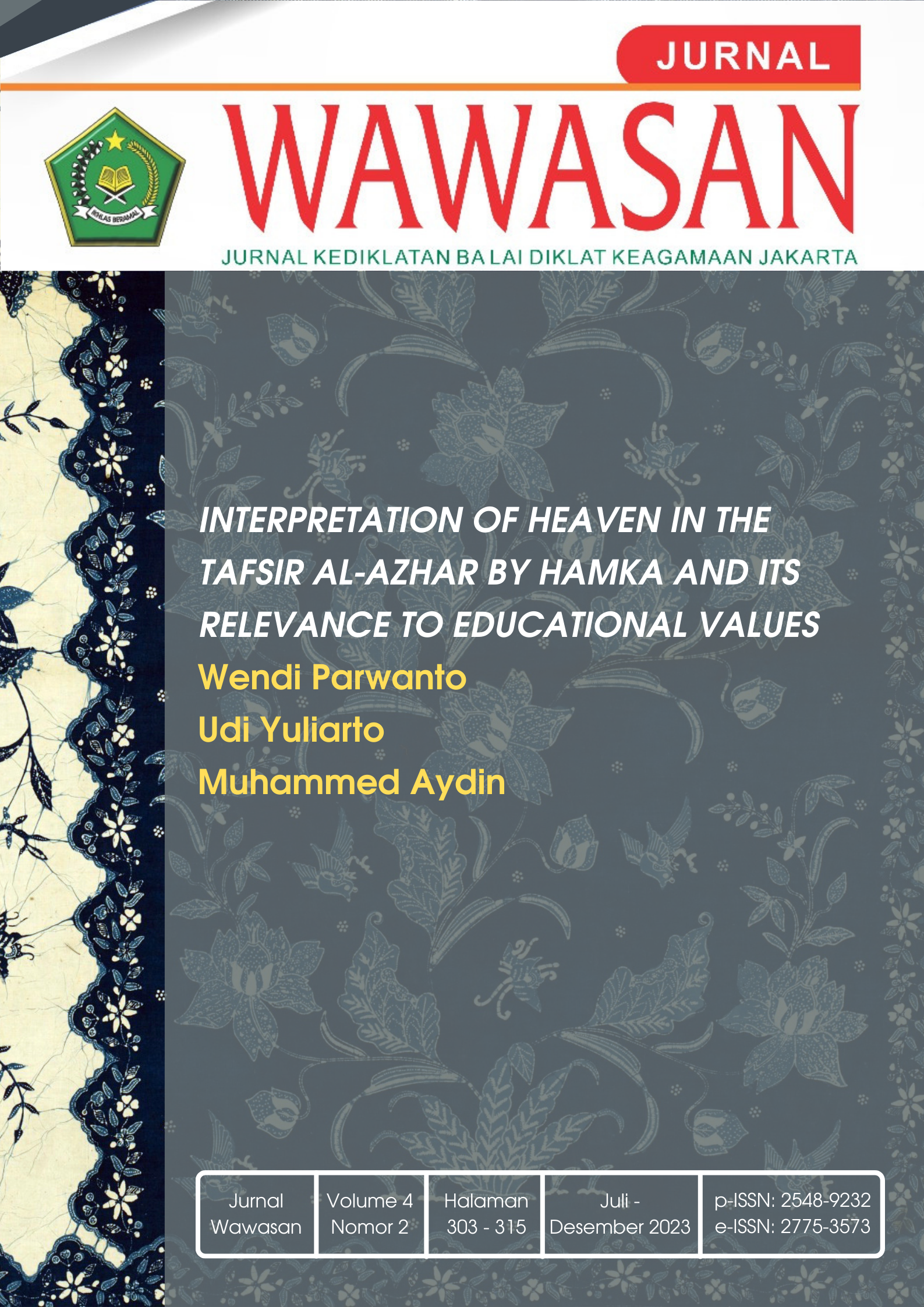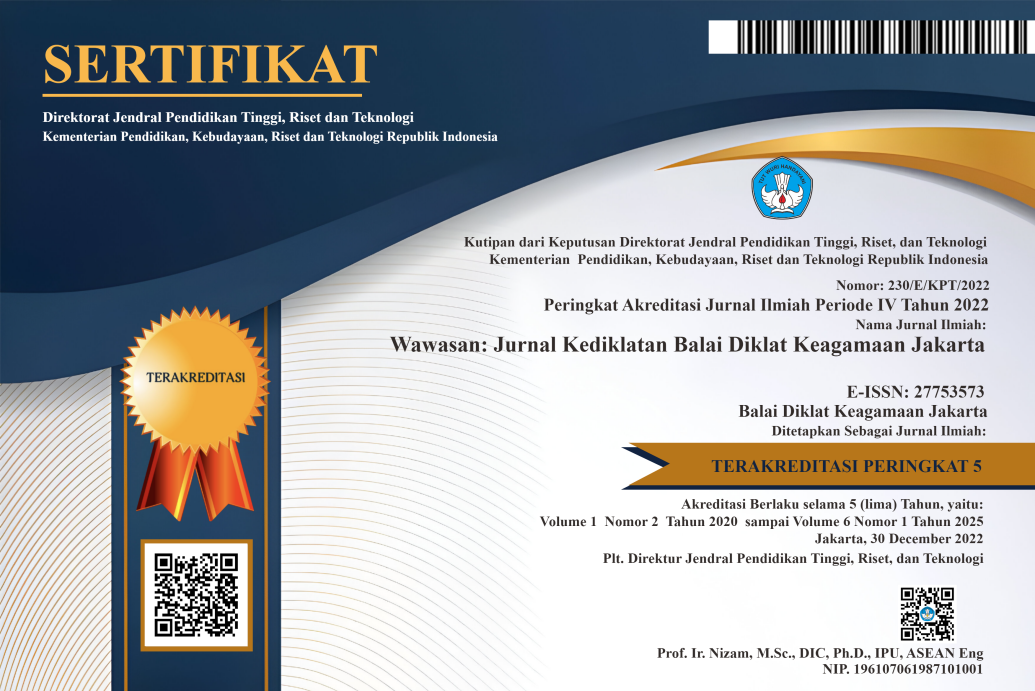INTERPRETATION OF HEAVEN IN THE TAFSIR AL-AZHAR BY HAMKA AND ITS RELEVANCE TO EDUCATIONAL VALUES
DOI:
https://doi.org/10.53800/wawasan.v4i2.252Keywords:
interpretation of heaven, genealogy of thought, Hamka; Al-AzharAbstract
Abstract
Many researchers have conducted studies on Hamka. However, studies on the rationalization of the interpretation of verses about Heaven and tracing the causes of the rationalization of performance have yet to be carried out. Therefore, the researcher was interested in conducting this study further. The type of this research is library research with a descriptive-analytical method. The genealogical theory of Michel Foucault explains the genealogy of Hamka's interpretation of thought. The conclusion of this article explains that, Firstly, Hamka attempts to make a rational and contextual interpretation of the verses describing Heaven. With the method of sensible and contextual performance, the metaphysical and abstract nature of Heaven becomes easily understood by readers (society), moreover explained by Hamka in simple language and explanation. Secondly, Hamka's rationalist thinking and contextual typology of description were influenced by several factors, including his life experience as a preacher, writer, organization, and his teachers. Thirdly, Hamka's interpretation of the verses about Heaven accommodates educational values between humans and God and also among humans.
Downloads
References
Abdullah, S., Sugiarto, F., Wahyudi, A. I., & Nurfanita, S. (2022). the Ethics of Dakwah on Social Media As Seen in Buya Hamka ’ S Tafsir Al-Azhar Through the Study of the Qur ’ an Surat an-Nisa ’ Verses 148-149. TASAMUH: Jurnal Komunikasi Dan Pengembangan Masyarakat Islam, 20(2), 149–166.
Affandi, Y., Abdillah, M. A., Asna, L., & Alhuwaymil, M. S. (2023). The Process of Human Creation in The View of HAMKA With The Nazhariyyat Al-Siyaq Approach (Analysis of The Book of Al-Azhar). International Journal Ihya’ ’Ulum Al-Din, 25(1), 33–48. https://doi.org/10.21580/ihya.25.1.15006
Arifin, Z., Hasan, M. R., & Haqqi, A. R. A. (2022). Qat’i and Zanni Debate From the Perspective of Qur’Anic Studies. QiST: Journal of Quran and Tafseer Studies, 2(1), 63–67. https://doi.org/10.23917/qist.v2i1.1248
Bahri, M. Z. (2018). Expressing political and religious identity: Religion-science relations in Indonesian Muslim Thinkers 1970-2014. Al-Jami’ah, 56(1), 155–186. https://doi.org/10.14421/ajis.2018.561.155-186
Dwi Fajri, M., Saepudin, D., Bahrudin, & Ibdalsyah. (2023). the Concept of Tauhid Education in the Family Environment: Study of Hamka’s Perspective. Profetika: Jurnal Studi Islam, 24(01), 33–45. https://doi.org/10.23917/profetika.v24i01.1672
Feener, R. M. (2017). James R. Rush, Hamka’s Great Story: A Master Writer’s Vision of Islam for Modern Indonesia. International Journal of Religions, 94(4).
Gozali, M. P., & Ibrahim, N. (2022). Buya Hamka : Nationalism in Islamic Education in Indonesia. 6(4), 528–535.
Gunawan, A. R. (2021). Relasi Otoritas dan Tradisi dalam Pewacanaan Pancasila pada Tafsir Al-Azhar. AL QUDS : Jurnal Studi Alquran Dan Hadis, 5(1), 183. https://doi.org/10.29240/alquds.v5i1.2202
Gusmian, I., & (Corresponding Author), M. A. (2023). Criticism of Social, Political, and Religious Problems in Indonesia: A Study on Al-Iklīl fī Ma‘ānī al-Tanzīl by Misbah Bin Zainil Mustafa (1917-1994). Journal of Al-Tamaddun, 18(1), 215–230. https://doi.org/10.22452/jat.vol18no1.18
Hamka. (1989). Tafsir Al Azhar. Pustaka Nasional PTE LTD.
Hamka. (2019). Ayahku. Gema Insani Press.
Hasan, H., Jahar, A. S., Umar, N., & Abdullah, I. (2022). Polygamy: Uncovering the effect of patriarchal ideology on gender-biased interpretation. HTS Teologiese Studies / Theological Studies, 78(4), 1–9. https://doi.org/10.4102/hts.v78i4.7970
Herlambang, S. (2020). HAMKA, SOCIAL CRITICISM AND THE PRACTICES OF POLYGAMY IN MINANGKABAU. Al-Albab, 9(1).
Ismail, N. B. (2017). The Qur’anic exegesis, reformism, and women in twentieth-century Indonesia. Studia Islamika, 24(3), 469–501. https://doi.org/10.15408/sdi.v24i3.5187
Izzan, A. (2022). PERGESERAN PENAFSIRAN MODERASI BERAGAMA MENURUT TAFSIR AL-AZHAR DAN TAFSIR AL-MISBAH. Studi Ilmu Al-Qur’an Dan Tafsir, 6(2), 129–141.
Kholid, A., Bakar, A., Muktafi, & Zamzami, M. (2021). Rereading the Indonesian interpretation of the Qur’an on Awliya’: The cases of Hamka and m. quraish shihab. Qudus International Journal of Islamic Studies, 9(1), 37–72. https://doi.org/10.21043/QIJIS.V9I1.7567
Lestari, D. P., Ningsih, T. Z., & Suryani, N. (2020). Transformation of Hamka’s Thought About Ethitical Values Through History Learning as a Reinforcement of Character Education. Indonesian Journal of Social Science Education (IJSSE), 2(1), 40–48. https://ejournal.iainbengkulu.ac.id/index.php/ijsse/article/view/2464/2293
Limbong, R. I., Chandra, A. F., Hakim, L., & Ghazali, M. bin. (2023). a Fair Leader Perspective Buya Hamka (Review of the Word ’Ulil Amri in Surah an Nisa: 59). QiST: Journal of Quran and Tafseer Studies, 2(2), 220–237. https://doi.org/10.23917/qist.v2i2.1308
Mansyur, S. (2018). Konsep Al-Qur’an Tentang Surga. Al-Asas, I(2), 1–13.
Merval Albufalasa. (2021). A Semantic Perspective on Referring Expressions of Paradise and Hell in the Holy Qur`an : The Case of Chapter 30 (Amma Part). International Journal of Linguistics, Literature and Translation, 4(3).
Michel Foucault. (1976). The Archaeology of Knowledge. Row Publisher.
Minanurrohman, A. (2021). Surga Dalam Tafsir Al-Misbah. UIN Tulung Agung.
Mukti, A., Nahar, S., & Fakrizal, F. (2022). Model of Family Education in Modern Era: Hamka’s Perspective on Al-Azhar’s Tafsir. AL-ISHLAH: Jurnal Pendidikan, 14(2), 1079–1088. https://doi.org/10.35445/alishlah.v14i2.2090
Mundzir, I., & Muthmainnah, Y. (2022). The progressiveness of Quranic interpretation in the fatwa of Muhammadiyah on female circumcision. Indonesian Journal of Islam and Muslim Societies, 12(2), 285–311. https://doi.org/10.18326/ijims.v12i2.285-311
Murodi. (2007). Al-Amr bi al-Ma’rūf wa al-Nahy ‘an al-Munkār: Dirāsah fi Arā’i al-‘Ālim HAMKA fī Tafsīr;al-Azhar. Studia Islamika, 14(2). https://doi.org/10.15408/sdi.v14i2.550
Parwanto, W. (2018). Penafsiran Surat Al-Falaq [113]: 3-4 : Menurut Abd. Ar-Rauf As-Singkili, Hamka dan M. Quraish Shihab: Telaah Atas Epistemologi dan Genealogi. MISYKAT: Jurnal Ilmu-Ilmu Al-Quran, Hadist, Syari’ah Dan Tarbiyah, 3(2), 205. https://doi.org/10.33511/misykat.v3n2.205-236
Parwanto, W. (2021). Visualization and Legalization of K . H . Ahmad Dahlan's Hisab Method in Tafsir al-Azhar by Hamka. 19(December), 166–177.
Parwanto, W., & Engku Alwi, E. A. Z. (2023). The Pattern of Sufism on Interpretation of Q.S. Al-Fatihah in the Tafsir Manuscript By M. Basiuni Imran Sambas, West Kalimantan. QiST: Journal of Quran and Tafseer Studies, 2(2), 163–179. https://doi.org/10.23917/qist.v2i2.1472
Parwanto, W., & Riyani, R. (2022). Visualisasi Nalar Esoteris dalam Tafsir Melayu-Jawi (Studi Interpretasi QS. Al-Fatihah dalam Manuskrip Tafsir M. Basiuni Imran Sambas Dan Tafsir Nurul Ihsan Said bin Umar Al-Kedah). Refleksi Jurnal Filsafat Dan Pemikiran Islam, 22(1), 27. https://doi.org/10.14421/ref.2022.2201-02
Pradini, N. P. L., & Nugroho, A. S. (2023). Buya Hamka Character Values in Forming Pancasila Student Profiles in Elementary. DIDAKTIKA TAUHIDI: Jurnal Pendidikan Guru Sekolah Dasar, 10(2), 189–202. https://doi.org/10.30997/dt.v10i2.9739
Rahim, F., & Bachtiar, H. (2023). Hamka’s neo-sufism in the context of modern society. Journal of Social Studies (JSS), 19(1), 1–14. https://doi.org/10.21831/jss.v19i1.57513
Rahmatulloh, R. (2022). Bank Interest In Tafsir Nusantara: Study Of The Book Of Al-Azhar In Genealogy Of Power’s Perspective Michael Foucault. MAGHZA: Jurnal Ilmu Al-Qur’an Dan Tafsir, 7(2), 100–117. https://doi.org/10.24090/maghza.v7i2.6903
Ramdhan, M. (2021). Metode Penelitian. Cipta Media Nusantara.
Rasyidil Fikri Alhijri, M., Reza Kusuma, A., Susanto, A., Zakki Azani, M., & Ali, M. (2023). Islamic Education for Women Based On Buya Hamka and Murtadha Muthahhari’s Thoughts. Edukasi Islami, 12(3), 1933–1948. https://doi.org/10.30868/ei.v12i03.4082
Riswan Sulaiman. (2017). Tafsir Isyari Tentang Surga Menurut Syekh Abd Al-Qadir Jailani. UIN Syarif Hidayatullah.
Samsul Bahri dan Hilal Refiana. (2017). Amtsal dalam Ayat-Ayat Surga dan Neraka. Tafse : Journal of Islamic Studies, 2(1), 46–62.
Siti Khodijah, dkk. (2023). Construction of moral education according to Hamka in Al-Azhar commentary. At-Tajdid, 12(2), 90–103. https://ejournal.isimupacitan.ac.id/index.php/tajdid/article/view/323
Ulinnuha, M., & Nafisah, M. (2020). Moderasi Beragama Perspektif Hasbi Ash-Shiddieqy, Hamka, Dan Quraish Shihab. Suhuf, 13(1), 55–76. https://doi.org/10.22548/shf.v13i1.519
Wendi Parwanto. (2022). THEOLOGICAL, ECOLOGICAL, AND HUMANIST EDUCATIONAL VALUES IN THE TAFSIR OF SURAH AL-FALAQ : HAMKA’S PERSPECTIVE. El-Tarbawi, 15(2), 199–224.
Zahra, N. S. A., Ali, M., & Salim, H. (2022). The Relevance of Buya Hamka’s Moral Philosophy to the Challenges of Education 4.0. Proceedings of the International Conference on Islamic and Muhammadiyah Studies (ICIMS 2022), 676(Icims), 289–297. https://doi.org/10.2991/assehr.k.220708.036
Zulkarnaini, Z. (2021). Feminist Exegesis in Hamka’s Tafsir Al-Azhar. Jurnal Studi Ilmu-Ilmu Al-Qur’an Dan Hadis, 22(2), 409. https://doi.org/10.14421/qh.2021.2202-07

Published
Issue
Section
License
Copyright (c) 2023 Wawasan: Jurnal Kediklatan Balai Diklat Keagamaan Jakarta

This work is licensed under a Creative Commons Attribution-ShareAlike 4.0 International License.

















